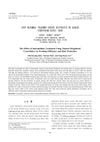 2 citations,
July 2019 in “Journal of psychology & clinical psychiatry”
2 citations,
July 2019 in “Journal of psychology & clinical psychiatry” Zinc helps reduce the severity of depression.
 2 citations,
April 2016 in “Medical Hypotheses”
2 citations,
April 2016 in “Medical Hypotheses” Antioxidants might help prevent pressure ulcers, but more research is needed to find effective ones.
[object Object]  1 citations,
January 2009 in “Elsevier eBooks”
1 citations,
January 2009 in “Elsevier eBooks” Anorexia Nervosa and Bulimia Nervosa are complex eating disorders with increasing incidence among young females, significant morbidity, and varying mortality rates, requiring more research for better treatment.
 May 2024 in “Portuguese journal of dermatology and venereology”
May 2024 in “Portuguese journal of dermatology and venereology” Reassurance and counseling are key in managing acute telogen effluvium, with supplements possibly offering a placebo effect.
 April 2024 in “Research Square (Research Square)”
April 2024 in “Research Square (Research Square)” Selenium supplements can help improve symptoms and metabolic markers in lupus patients.
 February 2024 in “Bangladesh pharmaceutical journal”
February 2024 in “Bangladesh pharmaceutical journal” The conclusion is that the tested yogurts from Bangladesh are rich in vitamins thiamine and riboflavin, and the testing method is reliable.

Bee pollen, green tea, essential oils, and various plant extracts improve skin and hair health.

Screening for iron levels in patients with hair loss may help find a genetic iron overload condition early.
 June 2022 in “International Journal of Health Sciences (IJHS) (En línea)”
June 2022 in “International Journal of Health Sciences (IJHS) (En línea)” Pregnant women with hair loss often have low zinc and iron levels.
 August 2021 in “Han'gug miyong haghoeji/Journal of the Korean society of cosmetology”
August 2021 in “Han'gug miyong haghoeji/Journal of the Korean society of cosmetology” Using natural polyphenol cross-linkers like tannic acid and green tea extract in perm treatments improves curling and protects hair.

The document is a detailed guide on skin conditions and treatments for dermatologists.

Diet and supplements can significantly affect acne, with some foods and nutrients reducing and others worsening it.
 July 2018 in “Journal of College of Medical Sciences-nepal”
July 2018 in “Journal of College of Medical Sciences-nepal” Women with certain types of hair loss may have low iron levels.
[object Object]  April 2018 in “Assiut Veterinary Medical Journal/Maǧallaẗ Asyūṭ al-ṭibiyyaẗ al-baytariyyaẗ”
April 2018 in “Assiut Veterinary Medical Journal/Maǧallaẗ Asyūṭ al-ṭibiyyaẗ al-baytariyyaẗ” Zinc levels in body fluids can help diagnose zinc deficiency in lambs, with fecal zinc as an early indicator.
 April 2019 in “Journal of emerging technologies and innovative research”
April 2019 in “Journal of emerging technologies and innovative research” Early treatment of Female Pattern Hair Loss is important to stop it from getting worse, and various treatments can help, especially in mild to moderate cases.
53 citations,
March 2003 in “Journal of Investigative Dermatology” Human skin cells have a high-affinity system for biotin transport, crucial for skin health.
7 citations,
February 2017 in “The American journal of medicine” People often have iron deficiency after weight-loss surgery, which can cause symptoms like hair loss and dizziness, and iron levels should be tested to diagnose it.
 August 2022 in “Journal of the American Academy of Dermatology”
August 2022 in “Journal of the American Academy of Dermatology” The authors agree they didn't discuss the risks of too much micronutrients and value the focus on biotin deficiency signs and treatment effectiveness.
2 citations,
June 2022 in “Phytomedicine” Shi-Bi-Man helps hair regrowth by activating the FGF pathway in cells.
5 citations,
October 2019 in “Giornale italiano di dermatologia e venereologia” Biotin supplements can improve certain skin disorders and hair loss when a deficiency is present.
 July 2024 in “Brazilian Journal of Clinical Medicine and Review”
July 2024 in “Brazilian Journal of Clinical Medicine and Review” Hair loss after bariatric surgery is common due to nutrient deficiencies and rapid weight loss.
 May 2022 in “Clinical Epigenetics”
May 2022 in “Clinical Epigenetics” A mother's iron levels early in pregnancy can influence the DNA makeup of her child, potentially affecting the child's health.
 16 citations,
November 2021 in “Antioxidants”
16 citations,
November 2021 in “Antioxidants” Managing oxidative stress might help treat low testosterone and related chronic diseases in aging men.
16 citations,
May 2009 in “Journal of child neurology” Valproic acid does not change biotinidase enzyme activity in children's blood.
13 citations,
July 2018 in “Obesity surgery” Over half of patients had hair loss after weight-loss surgery, especially women, linked to low zinc and vitamin B12 levels.
 8 citations,
January 2018 in “Middle East Journal of Digestive Diseases”
8 citations,
January 2018 in “Middle East Journal of Digestive Diseases” A man with complete hair loss and ulcerative colitis regrew hair after treatment with azathioprine.
 7 citations,
October 2020 in “Dermatology practical & conceptual”
7 citations,
October 2020 in “Dermatology practical & conceptual” Some skin, hair, and nail supplements can be toxic, interact with medications, affect lab tests, and may increase cancer risk.
 2 citations,
May 2022 in “Cosmetics”
2 citations,
May 2022 in “Cosmetics” Further research is needed to understand how the microbiome affects hair loss in Alopecia Areata.
2 citations,
December 2021 in “Cureus” Low vitamin D levels are linked to hair loss, and vitamin D might help treat it.
1 citations,
January 2018 in “Molecular and integrative toxicology” Getting the right amount of selenium is important for health; too little can cause disease, and too much can lead to toxicity.






















